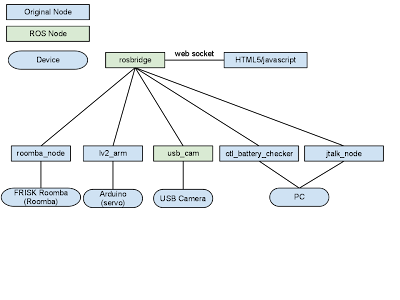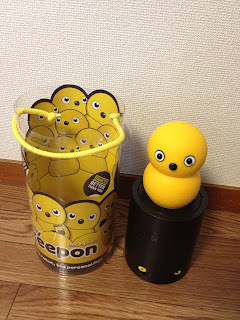前回OpenRTM-aistからROSを使えるようにしました。
次はお決まりですがルンバを動かします。
今回はOpenRTM-aistの仮想ジョイスティックコンポーネントを利用してルンバを動かします。
構成としては
TkJoyStick(RTC) -> JoyRTM2velROS(今回作ったコンポーネント)(RTC/ROS) -> いつもの自作ルンバノード(ROS)
という感じです。
TkJoyStickはOpenRTM-aistのサンプルに入っていて、ジョイスティックっぽいGUIです。
面倒なのでビデオ解説です。
JoyRTM2velROSのソースはTkJoyStickからの入力(TimedFloatSeq)をROSのgeometry_msgs/Twist型に変換しているだけです。
やはりOpenRTMとROSは非常に似ていますね。
OpenRTM-aistのコードの自動生成は便利だけど修正がめんどくさいです。
とくにRosPortのように標準ツールでサポートされていないと大変です。
なにかいい方法があれば教えてください。
参考程度にcppのソースファイルだけ貼りつけておきます。
いつも通り適当です。
一応リポジトリに
otl-ros-pkg/otl_nav/JoyRTM2velROS
としておいておきました。
【参考サイト】
http://code.google.com/p/rtm-ros-robotics/wiki/rosport_Example
http://code.google.com/p/rtm-ros-robotics/wiki/RTM_HelloWorldSample
ヘッダファイル
// -*- C++ -*-
/*!
* @file JoyRTM2velROS.h
* @brief convert Joystick sample port to ROS twist msg
* @date $Date$
*
* $Id$
*/
#ifndef JOYRTM2VELROS_H
#define JOYRTM2VELROS_H
#include <rtm/Manager.h>
#include <rtm/DataFlowComponentBase.h>
#include <rtm/CorbaPort.h>
#include <rtm/DataInPort.h>
#include <rtm/DataOutPort.h>
#include <rtm/idl/BasicDataTypeSkel.h>
#include <rtm/idl/ExtendedDataTypesSkel.h>
#include <rtm/idl/InterfaceDataTypesSkel.h>
#include <rtm/RosOutPort.h>
#include "geometry_msgs/Twist.h"
using namespace RTC;
/*!
* @class JoyRTM2velROS
* @brief convert Joystick sample port to ROS twist msg
*
*/
class JoyRTM2velROS
: public RTC::DataFlowComponentBase
{
public:
/*!
* @brief constructor
* @param manager Maneger Object
*/
JoyRTM2velROS(RTC::Manager* manager);
/*!
* @brief destructor
*/
~JoyRTM2velROS();
/***
*
* The initialize action (on CREATED->ALIVE transition)
* formaer rtc_init_entry()
*
* @return RTC::ReturnCode_t
*
*
*/
virtual RTC::ReturnCode_t onInitialize();
/***
*
* The execution action that is invoked periodically
* former rtc_active_do()
*
* @param ec_id target ExecutionContext Id
*
* @return RTC::ReturnCode_t
*
*
*/
virtual RTC::ReturnCode_t onExecute(RTC::UniqueId ec_id);
protected:
// Configuration variable declaration
//
/*!
*
* - Name: max_linear_velocity
* - DefaultValue: 0.1
*/
double m_max_linear_velocity;
/*!
*
* - Name: max_angular_velocity
* - DefaultValue: 0.2
*/
double m_max_angular_velocity;
//
// DataInPort declaration
//
TimedFloatSeq m_joyInput;
/*!
*/
InPort m_joyInputIn;
// ROS Port
geometry_msgs::Twist m_rosVel;
RosOutPort m_rosVelOut;
private:
};
extern "C"
{
DLL_EXPORT void JoyRTM2velROSInit(RTC::Manager* manager);
};
#endif // JOYRTM2VELROS_H
実体(.cpp)
// -*- C++ -*-
/*!
* @file JoyRTM2velROS.cpp
* @brief convert Joystick sample port to ROS twist msg
* @date $Date$
*
* $Id$
*/
#include "JoyRTM2velROS.h"
// Module specification
// <rtc-template block="module_spec">
static const char* joyrtm2velros_spec[] =
{
"implementation_id", "JoyRTM2velROS",
"type_name", "JoyRTM2velROS",
"description", "convert Joystick sample port to ROS twist msg",
"version", "1.0.0",
"vendor", "OTL",
"category", "Sample",
"activity_type", "PERIODIC",
"kind", "DataFlowComponent",
"max_instance", "1",
"language", "C++",
"lang_type", "compile",
// Configuration variables
"conf.default.max_linear_velocity", "0.2",
"conf.default.max_angular_velocity", "0.4",
// Widget
"conf.__widget__.max_linear_velocity", "slider",
"conf.__widget__.max_angular_velocity", "slider",
// Constraints
""
};
// </rtc-template>
/*!
* @brief constructor
* @param manager Maneger Object
*/
JoyRTM2velROS::JoyRTM2velROS(RTC::Manager* manager)
// <rtc-template block="initializer">
: RTC::DataFlowComponentBase(manager),
m_joyInputIn("joy_input", m_joyInput)
// </rtc-template>
,
m_rosVelOut("cmd_vel", "rtm2ros", m_rosVel)
{
}
/*!
* @brief destructor
*/
JoyRTM2velROS::~JoyRTM2velROS()
{
}
RTC::ReturnCode_t JoyRTM2velROS::onInitialize()
{
// Registration: InPort/OutPort/Service
// <rtc-template block="registration">
// Set InPort buffers
addInPort("joy_input", m_joyInputIn);
// Set OutPort buffer
// Set service provider to Ports
// Set service consumers to Ports
// Set CORBA Service Ports
// </rtc-template>
// <rtc-template block="bind_config">
// Bind variables and configuration variable
bindParameter("max_linear_velocity", m_max_linear_velocity, "0.2");
bindParameter("max_angular_velocity", m_max_angular_velocity, "0.4");
// </rtc-template>
addRosOutPort("ros_velocity", m_rosVelOut);
return RTC::RTC_OK;
}
RTC::ReturnCode_t JoyRTM2velROS::onExecute(RTC::UniqueId ec_id)
{
if(m_joyInputIn.isNew()) {
m_joyInputIn.read();
m_rosVel.linear.x = m_joyInput.data[1] * 0.005;
m_rosVel.angular.z = -m_joyInput.data[0] * 0.010;
if ( m_max_linear_velocity < m_rosVel.linear.x) {
m_rosVel.linear.x = m_max_linear_velocity;
} else if (-m_max_linear_velocity > m_rosVel.linear.x) {
m_rosVel.linear.x = -m_max_linear_velocity;
} else if (fabs(m_rosVel.linear.x) < 0.01) {
m_rosVel.linear.x = 0.0;
}
if ( m_max_angular_velocity < m_rosVel.angular.z) {
m_rosVel.angular.z = m_max_angular_velocity;
} else if (-m_max_angular_velocity > m_rosVel.angular.z) {
m_rosVel.angular.z = -m_max_angular_velocity;
} else if (fabs(m_rosVel.angular.z) < 0.01) {
m_rosVel.angular.z = 0.0;
}
m_rosVelOut.write();
}
return RTC::RTC_OK;
}
extern "C"
{
void JoyRTM2velROSInit(RTC::Manager* manager)
{
coil::Properties profile(joyrtm2velros_spec);
manager->registerFactory(profile,
RTC::Create<JoyRTM2velROS>,
RTC::Delete<JoyRTM2velROS>);
}
};
















